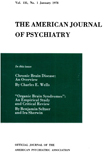ANALYSIS OF TEMPORAL FACTORS IN MANIC-DEPRESSIVE PSYCHOSIS, WITH PARTICULAR REFERENCE TO THE EFFECT OF SHOCK THERAPY
Abstract
A review of temporal factors in 262 cases of manic-depressive psychosis indicates that the onset of illness is somewhat later in men than in women. Neither the age of onset, i.e., before or after 40, nor the type of predominant phase of illness, i.e., manic or depressive episodes, exerts a significant influence on the frequency of attacks or the length of remissions. The duration of hospitalization in untreated patients is essentially similar for manic and depressive episodes. Shock therapy effects a marked reduction in the duration of hospitalization of depressed patients; the effect is slightly greater for first hospitalizations than for later ones. There is less prominent shortening of length of hospitalization by shock therapy during manic episodes. In each instance the proportion of protracted hospitalizations is definitely diminished. The effect of shock therapy on length of remissions is not entirely clarified. However, it may be stated that shock therapy diminishes the incidence of rehospitalization within one year of discharge irrespective of the numerical order of the illness. The question as to whether or not the incidence of lengthy remissions is affected by shock therapy can be answered only after another decade or more of observation has elapsed.
Access content
To read the fulltext, please use one of the options below to sign in or purchase access.- Personal login
- Institutional Login
- Sign in via OpenAthens
- Register for access
-
Please login/register if you wish to pair your device and check access availability.
Not a subscriber?
PsychiatryOnline subscription options offer access to the DSM-5 library, books, journals, CME, and patient resources. This all-in-one virtual library provides psychiatrists and mental health professionals with key resources for diagnosis, treatment, research, and professional development.
Need more help? PsychiatryOnline Customer Service may be reached by emailing [email protected] or by calling 800-368-5777 (in the U.S.) or 703-907-7322 (outside the U.S.).



